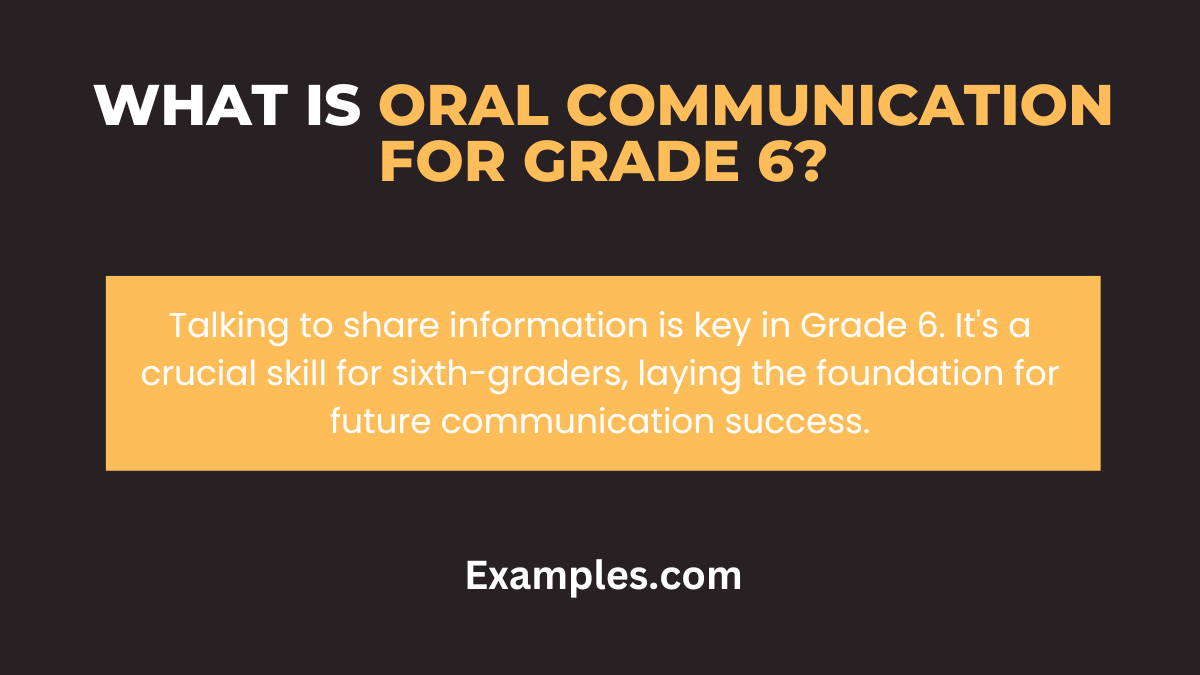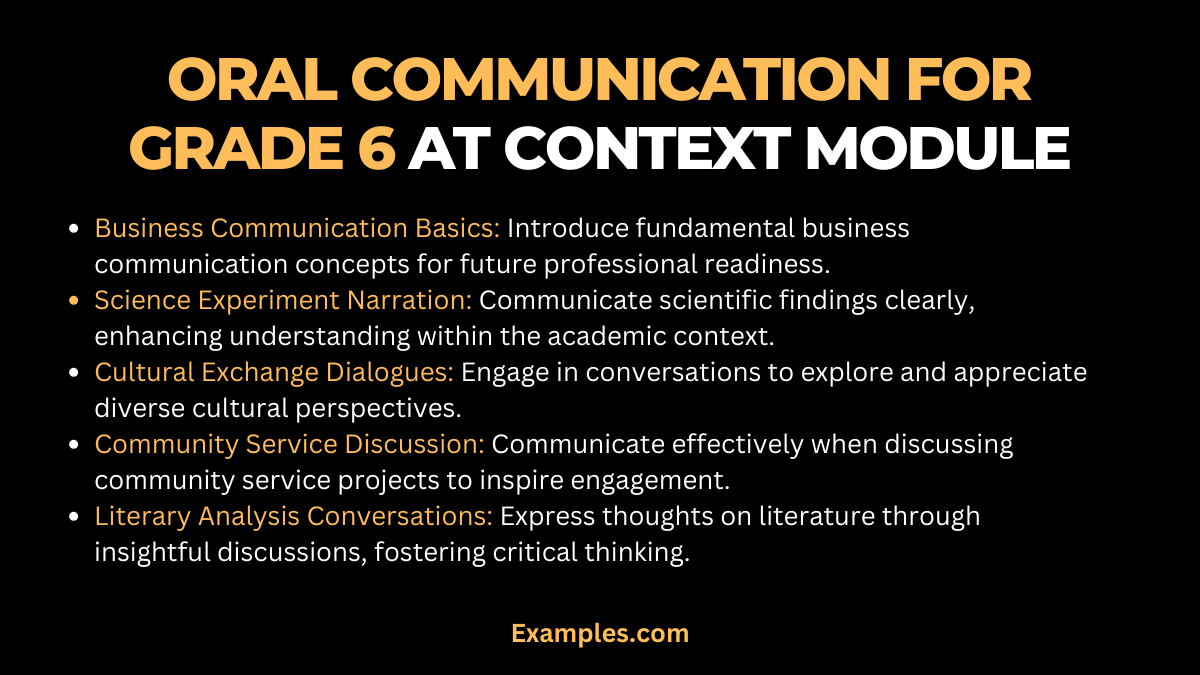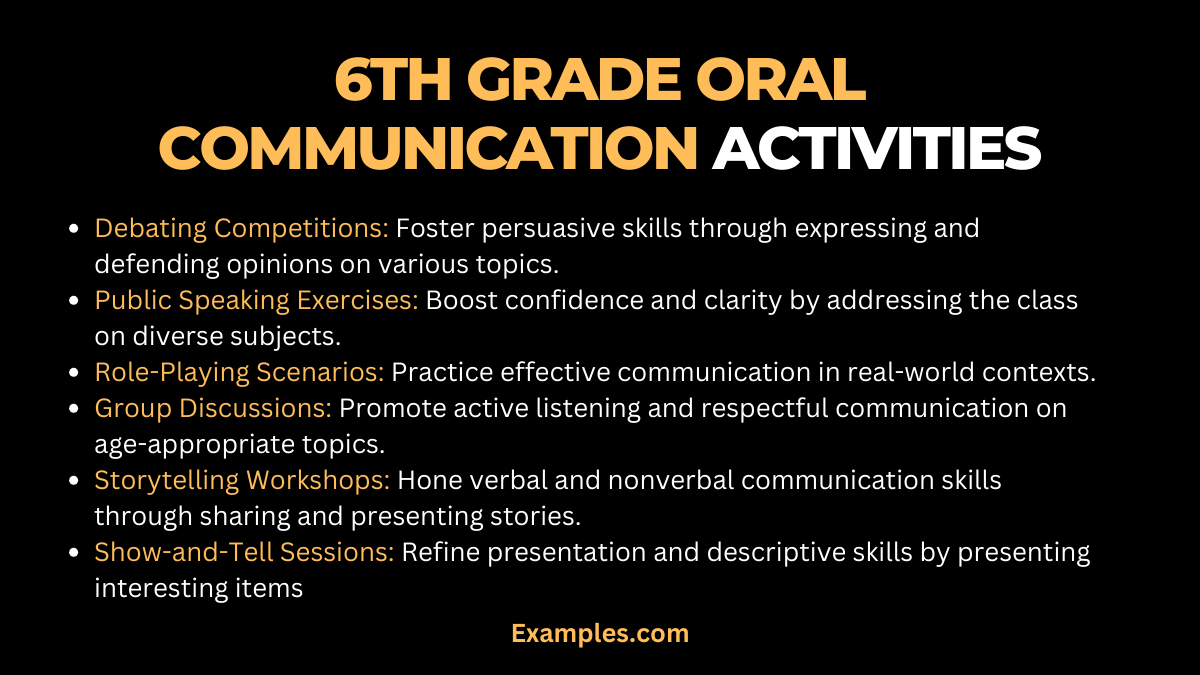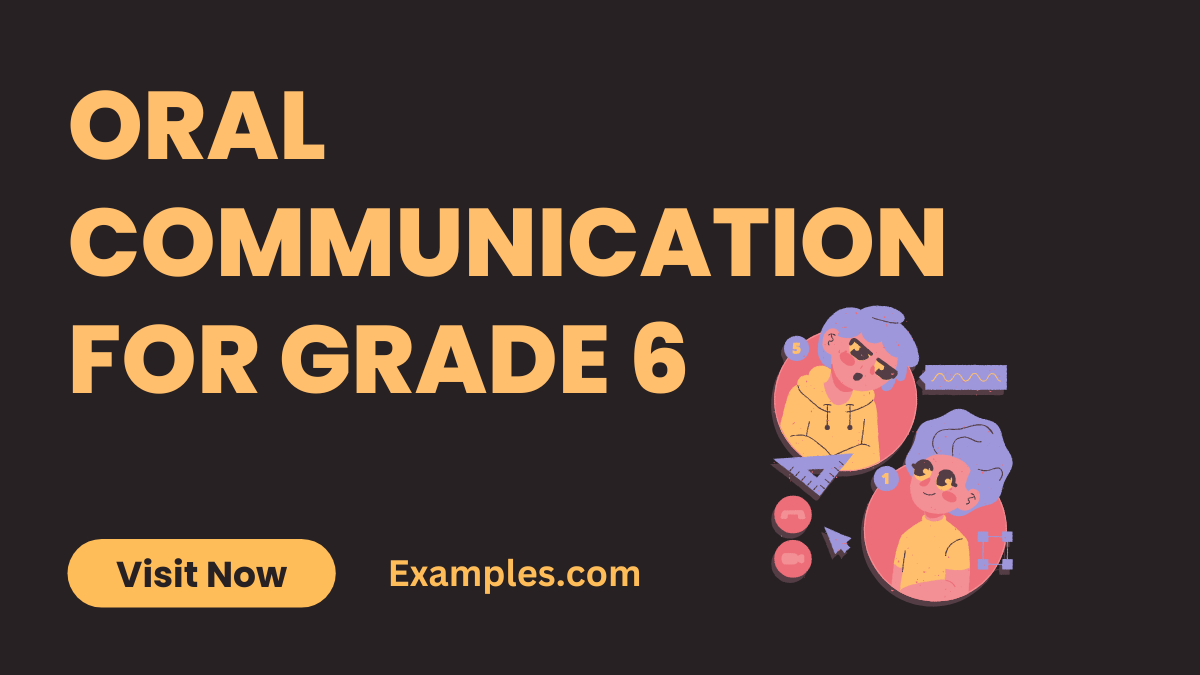29+ Oral Communication for Grade 6 Examples
Embark on a journey into the realm of Oral Communication for Grade 6 with our comprehensive guide. Uncover the nuances of effective communication tailored for sixth-graders, accompanied by vivid Communication Examples. This resource is designed to enhance understanding, imparting valuable insights into the art of expression, fostering essential skills for lifelong success.
What is Oral Communication for Grade 6?

In simple English, Oral Communication for Grade 6 refers to the exchange of information through spoken words. This fundamental skill plays a pivotal role in shaping effective communication habits among sixth-graders, laying the foundation for future success.
What is the Best Example of Oral Communication for Grade 6?
Explore an exemplar of effective communication tailored for sixth-graders. This section delves into a detailed explanation, providing valuable insights into a standout example of Oral Communication for Grade 6. Learn from real-world scenarios to sharpen communication skills in various contexts.
30 Oral Communication for Grade 6 Examples
Discover the richness of Oral Communication for Grade 6 through our curated list of 30 examples. Each example is crafted to enhance communication skills, fostering a dynamic environment for sixth-graders. Unleash the power of effective expression with our designed to elevate your understanding of communication at this crucial developmental stage.
- Classroom Collaboration: Engage in vibrant discussions to boost teamwork and understanding.
- Show-and-Tell Mastery: Perfect the art of presenting, capturing attention with interesting personal items.
- Role-Playing Scenarios: Act out different situations for a practical grasp of communication nuances.
- Debating Skills Showcase: Hone persuasive abilities through structured debates on intriguing topics.
- Expressive Storytelling: Craft vivid narratives to captivate your audience and convey ideas effectively.
- Effective Peer Feedback: Learn the art of constructive criticism for continuous improvement.
- Asking Thoughtful Questions: Develop curiosity and encourage meaningful conversations.
- Collaborative Problem-Solving: Work collectively to find creative solutions to challenges.
- Public Speaking Confidence: Build self-assurance by addressing peers on diverse subjects.
- Group Project Coordination: Coordinate efforts seamlessly for successful collaborative projects.
- Active Listening Practice: Enhance understanding by listening attentively to peers’ perspectives.
- Persuasive Essay Presentation: Convert a written essay into a compelling oral presentation.
- Interview Simulation: Experience simulated job interviews for real-world communication readiness.
- Story Building Game: Collaboratively construct a story, enhancing creativity and cooperation.
- Effective Use of Visual Aids: Learn to complement verbal communication with impactful visuals.
- Role of Nonverbal Cues: Understand and utilize body language for clearer communication.
- Creative Poetry Reading: Express emotions through the art of reading and reciting poetry.
- Impromptu Speaking Challenges: Sharpen spontaneous communication skills with on-the-spot topics.
- Dealing with Peer Conflict: Navigate conflicts diplomatically through effective communication.
- Expressing Gratitude: Cultivate a positive atmosphere by expressing appreciation genuinely.
- Conveying Empathy: Develop the ability to understand and relate to others’ feelings.
- Group Decision-Making: Participate in decision-making discussions for collective choices.
- Scientific Presentation: Communicate complex ideas clearly in a scientific or academic context.
- Leadership Communication: Exhibit leadership qualities through clear and inspiring communication.
- Interactive Language Games: Play language-based games for a fun approach to communication skills.
- Community Outreach Discussion: Engage in discussions related to community issues for awareness.
- Digital Storytelling: Embrace technology to convey stories through multimedia platforms.
- Cultural Exchange Dialogue: Learn about diverse cultures through interactive communication.
- Classroom News Reporting: Enhance communication skills by reporting news to the class.
- Creative Writing Reading Session: Share and discuss creatively written pieces with peers for inspiration.
Oral Communication Presentation for Grade 6:
Elevate your grade 6 classroom experience with our Oral Communication Presentation guide. Unleash the power of effective presentation skills tailored for sixth-graders. ensuring a seamless blend of technology and communication in the learning journey.
- Dynamic Slideshow Mastery: Craft engaging presentations with visuals to enhance message retention.
- Interactive Q&A Session: Foster audience engagement through well-managed question and answer segments.
- Role-Playing Presentations: Act out scenarios to communicate ideas effectively and develop empathy.
- Peer Feedback Symposium: Encourage constructive criticism for continuous improvement in presentation skills.
- Storytelling through Multimedia: Utilize multimedia elements to narrate compelling stories for impactful presentations.
- Classwide Debate Forum: Organize structured debates to enhance critical thinking and persuasive communication.
- Digital Storyboard Creation: Develop presentations using digital storyboarding for a visually appealing experience.
- Real-World Application Talks: Connect classroom learning to real-world applications for practical understanding.
- Team Project Showcase: Collaborate on projects and present findings collectively for a holistic learning experience.
- Expressive Poetry Reading: Share emotions through poetic expressions, fostering creativity and communication skills.
Oral Communication for Grade 6 at Context Module:

Explore the contextual nuances of Oral Communication for Grade 6 with our specialized module. Tailored for sixth-graders, this guide emphasizes practical application, providing a comprehensive understanding of communication within specific contexts. Navigate through various modules, each enriched with insights, ensuring a holistic development of communication skills.
- Business Communication Basics: Introduce fundamental business communication concepts for future professional readiness.
- Science Experiment Narration: Communicate scientific findings clearly, enhancing understanding within the academic context.
- Cultural Exchange Dialogues: Engage in conversations to explore and appreciate diverse cultural perspectives.
- Community Service Discussion: Communicate effectively when discussing community service projects to inspire engagement.
- Literary Analysis Conversations: Express thoughts on literature through insightful discussions, fostering critical thinking.
- Role of Communication in History: Explore historical events through the lens of effective communication for a comprehensive understanding.
- Math Problem-Solving Dialogues: Communicate mathematical solutions clearly, emphasizing clarity in explanations.
- Environmental Awareness Talks: Address environmental issues through effective communication for heightened awareness.
- Creative Writing Feedback Session: Share and discuss creatively written pieces with peers to inspire and refine skills.
- Interactive Language Games: Play language-based games within specific contexts for a fun approach to communication skills development
What are the 6th Grade Oral Communication Activities?

In the realm of sixth-grade oral communication, a standout example is the “Interactive Storytelling Workshop.” This engaging activity involves students collaboratively creating and presenting a story. Each student contributes a segment, weaving together a cohesive narrative. Through this exercise, students not only enhance their storytelling abilities but also practice active listening and seamless transitions. This example not only develops communication skills but also fosters teamwork and creativity, providing a holistic learning experience.
- Debating Competitions: Encourage students to express and defend their opinions on various topics, fostering persuasive communication skills.
- Public Speaking Exercises: Provide opportunities for students to address the class on diverse subjects, boosting confidence and clarity in expression.
- Role-Playing Scenarios: Engage students in real-world scenarios, allowing them to practice effective communication in different contexts.
- Group Discussions: Facilitate discussions on age-appropriate topics, promoting active listening and respectful communication.
- Storytelling Workshops: Encourage students to share and present stories, honing both verbal and nonverbal communication skills.
- Show-and-Tell Sessions: Create a platform for students to present interesting items, refining presentation and descriptive communication skills.
What is Oral Communication Language in 6th Grade?
In 6th grade, oral communication plays a crucial role in developing language skills. One outstanding example is incorporating storytelling as a means of expression and engagement. Storytelling not only captivates the audience but also enhances communication skills in students.
Understanding Oral Communication Language in 6th Grade
In the 6th-grade curriculum, oral communication language involves various aspects. Two key components include:
- Expressive Communication: Encouraging students to share their thoughts, ideas, and experiences verbally. This fosters self-confidence and effective communication skills.
- Listening Skills: Emphasizing the importance of attentive listening, comprehension, and appropriate responses. Developing strong listening skills is fundamental for effective oral communication.
In conclusion, the importance of oral communication in the academic and social development of Grade 6 students cannot be overstated. As highlighted on the Brookes Blog, oral language skills are crucial for students to process instructions, make requests, ask questions, receive new information, and interact with peers??. The implementation of effective strategies is essential to support and enhance these skills. For instance, teachers can encourage students to use complete oral syntax in the classroom, engage in eye contact during instruction, and ask students to monitor their speech muscles and volume??????. Additionally, incorporating activities that require summarization and discussion of information can significantly aid in the development of these skills??.
Moreover, Edutopia suggests innovative approaches such as creating book clubs or literary circles, which can foster a love for reading while enhancing speaking and listening skills??. Implementing Socratic seminars with open-ended questions can also be a dynamic way to engage students across various subjects??. Accountable Talk is another effective strategy that scaffolds responsible, responsive dialogue, and collaborative, group-based learning ensures that conversations are equitable and inclusive??. Lastly, reorganizing classroom furniture to create a comfortable and conversational learning environment can further support these skills?? 14 Ways to Improve Your Students’ Oral Language Skills which provides a comprehensive list of strategies and insights into the importance of oral communication in an academic setting Edutopia: Speaking and Listening Skills: Strategies for the Classroom which offers innovative and practical strategies for enhancing speaking and listening skills in the classroom.



